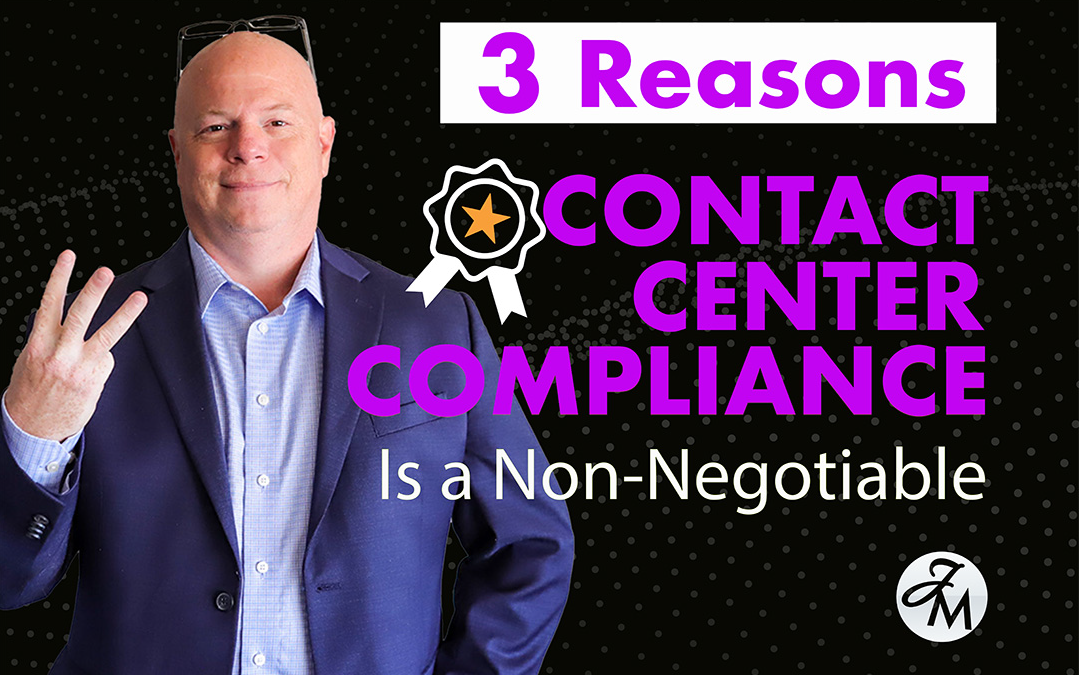Running a contact center means you are juggling hundreds, maybe thousands, of daily calls. While this hive of activity is the heart of your business, a nagging thought can be unsettling. A single misstep by one agent on one call could result in severe consequences.
The pressure of maintaining contact center compliance can feel overwhelming. Many rules and regulations govern your customer interactions. Breaking them, even accidentally, can lead to serious trouble.
Here you will learn what contact center compliance means for your operation, why it is more than just a legal hurdle, and how you can manage it effectively. The quality and origin of your leads are a bigger piece of this puzzle than you might realize.
Table of Contents:

- So What is This Contact Center Compliance I Keep Hearing About?
- How Did We Even Get Here? A Quick History Lesson
- The New FCC Rules are Shaking Things Up
- Why Contact Center Compliance Is a Non-Negotiable
- The Steep Price of Getting It Wrong
- Common Compliance Mistakes You Can Easily Avoid
- Finding Compliant Leads Is Half the Battle
So What is This Contact Center Compliance I Keep Hearing About?
Contact center compliance is about following the rules set by various governing bodies. These regulations can come from local, state, federal, and even international authorities. They dictate everything from how you manage customer data to the specific language used in a sales call.
This goes beyond avoiding hefty fines. Proper compliance is a critical part of building customer trust and safeguarding your brand’s reputation. It serves as the foundation for a healthy, lasting relationship with the people you serve.
Strong adherence to data protection regulations shows customers you value their privacy, which is essential for consumer protection. This commitment helps build a loyal customer base and a positive public image.
How Did We Even Get Here? A Quick History Lesson
It may be hard to imagine, but call centers once operated with very few regulations. For a long time, the industry lacked formal rules, leading to inconsistent and sometimes aggressive practices. That all changed with the Telephone Consumer Protection Act (TCPA) in 1991.

The TCPA was a landmark piece of legislation aimed at curbing unsolicited and annoying telemarketing calls. Shortly after, industry-specific rules like the Health Insurance Portability and Accountability Act (HIPAA) emerged to protect sensitive customer information. Over time, concepts like the National Do-Not-Call Registry became standard practice.
As technology progressed, the regulations evolved alongside it. Today, we have a complex landscape of rules including the Payment Card Industry Data Security Standard (PCI DSS) for payment card information and the Fair Debt Collection Practices Act (FDCPA) for debt collection. The General Data Protection Regulation (GDPR) in Europe also established a high data security standard that impacts businesses around the globe.
The New FCC Rules are Shaking Things Up
Just when you thought you understood the landscape, the rules are changing yet again. Beginning in January 2025, the FCC is implementing new lead generation requirements under the TCPA. These rules are designed to combat robocalls and robotexts by changing how businesses obtain customer consent.
The most significant change is the move to “one-to-one” consent. This principle requires a consumer to grant permission to one specific company at a time for contact. The practice of obtaining a single consent to share a lead with an entire network of partners is no longer permissible.
This new rule fundamentally alters how lead generation companies must operate. This is where a professional marketplace like Online Lead Exchange offers incredible value. They connect you with hundreds of buyers and sellers in the call center, email, and SMS space who understand these new rules and prioritize fully compliant leads.
Why Contact Center Compliance Is a Non-Negotiable
It can be tempting to view compliance as just another administrative task to check off. This is a critical error in judgment. Adhering to compliance regulations directly influences every aspect of your contact center’s performance and sustainability.
It Fuels Your Sales Engine
When customers trust your brand, they are far more likely to do business with you. Strong compliance practices demonstrate that you respect their privacy and are serious about data security. A reputation for carelessness, on the other hand, will quickly send potential customers to your competition.
It Keeps Customer Service Strong
Following compliance guidelines often improves the overall customer experience. It means agents provide accurate information and handle every customer interaction professionally. Top-performing agents prefer to work for reputable companies, so a commitment to compliance can also help reduce employee turnover.
It’s Crucial for Collections
If your contact center handles collections, a deep understanding of the Fair Debt Collection Practices Act (FDCPA) is mandatory. The act outlines clear rules for what debt collectors can and cannot do when attempting to collect a debt. Ignoring these collection practices is a fast path to significant legal action.
The Steep Price of Getting It Wrong

Ignoring contact center compliance is a gamble you cannot afford to take. Eventually, a lack of regular compliance will lead to negative consequences. These outcomes are often more severe than business leaders anticipate.
Here is what you are risking:
- Crushing Fines and Legal Battles: Regulatory bodies have the authority to impose massive penalties. TCPA violations, for example, can result in fines of thousands of dollars per call, which can quickly add up to millions.
- Operational Shutdowns: In cases of serious violations, authorities may force your operations to shut down until the issues are resolved. This translates to lost revenue, idle employees, and a halt in business momentum.
- A Damaged Reputation: Customer trust is difficult to earn and incredibly easy to lose. A data breach or a public compliance scandal can tarnish your brand’s image for years, making it difficult to attract new customers.
- Unhappy Customers: Violating consumer protection laws creates dissatisfied customers. They file complaints, post negative reviews online, and share their poor experiences with friends and family.
Common Compliance Mistakes You Can Easily Avoid
Many contact centers fall into the same traps when it comes to compliance. The positive news is that by identifying these common errors, you can implement proactive measures to prevent them. Avoiding these pitfalls is a key part of managing compliance risk.
- Recording Calls Without Permission: You must obtain consent from customers before recording a conversation. A clear notification at the beginning of the call is usually sufficient, but the disclosure must be unambiguous.
- Mishandling Payment Information: Violating the Payment Card Industry Data Security Standard (PCI DSS) is a major risk for any organization that handles credit card data. Storing sensitive authentication data, such as PINs or security codes, is strictly forbidden and can lead to severe penalties.
- Calling People on the Do-Not-Call List: It is essential to scrub your calling lists against the national and state DNC registries. A quality lead marketplace like Online Lead Exchange helps you get leads from people who have explicitly opted in to be contacted.
- Using Strong-Arm Tactics in Collections: Agents engaged in debt collection are prohibited from threatening, harassing, or deceiving customers. Such behavior is a direct violation of the FDCPA and will expose your company to serious legal repercussions.
- Providing Inadequate Training: A lack of continuous compliance training for center agents is a recipe for disaster. An untrained or poorly informed agent can inadvertently commit a violation that costs the company dearly.
Your Guide to Acing Contact Center Compliance
Feeling overwhelmed by all the rules? There is no need to be. By concentrating on a few essential areas, you can build a robust compliance framework that protects your business and your customers.
Keep Your Network Airtight
With a growing number of agents working remotely, network security has become a significant challenge. Implement strong network access controls to restrict who can access sensitive customer data. Proper security measures, like multi-factor authentication, can prevent unauthorized users from gaining entry to your systems.
Make Sure Customers Are Who They Say They Are

Customer authentication is crucial for preventing fraud and protecting customer accounts. Use multi-factor authentication whenever possible to verify a customer’s identity. Requiring multiple pieces of information before discussing sensitive account details helps confirm you are speaking to the right person.
Guard Data Like It’s Fort Knox
You have a responsibility to protect sensitive data at all times, whether it is in transit or at rest. Use advanced encryption to secure stored information and communication channels. Tools like secure IVR systems can process payments automatically, which means a human agent never has to see or handle a customer’s full credit card number.
Train Your Agents Until It’s Second Nature
Your agents represent your company and are the first line of defense against compliance violations. They require ongoing compliance training on all relevant center compliance regulations. A well-educated team is significantly less likely to make an expensive mistake.
Use Technology to Your Advantage
You cannot personally monitor every call, but modern center solutions can. AI-powered speech analytics tools can analyze 100% of customer interactions to flag potential compliance issues. These systems can also automatically redact sensitive information, like a phone number or payment details, from call recordings and transcripts.
Know the Alphabet Soup of Regulations
It is helpful to be familiar with the main compliance regulations that affect your industry. While this list is not exhaustive, these are some of the most important ones to know. Good quality management depends on understanding these rules.
| Regulation | What It Covers | Primary Industry |
|---|---|---|
| TCPA (Telephone Consumer Protection Act) | Governs telemarketing calls, autodialers, and unsolicited texts. Includes the Telemarketing Sales Rule. | Telemarketing & Sales |
| HIPAA (Health Insurance Portability and Accountability Act) | Protects sensitive patient health information from being disclosed without consent. | Healthcare & Financial Services |
| GDPR (General Data Protection Regulation) | Sets strict rules for processing and handling the personal data of EU citizens. | Any company with EU customers |
| FDCPA (Fair Debt Collection Practices Act) | Prevents abusive, unfair, or deceptive debt collection practices by debt collectors. | Debt Collection |
| PCI DSS (Payment Card Industry Data Security Standard) | Secures credit card and debit card transactions against data theft and fraud. | Any company that accepts card payments |
Finding Compliant Leads Is Half the Battle
You can have the most skilled agents and the most efficient processes, but you are set up for failure if your leads are not compliant. Finding lead sources that understand and adhere to compliance requirements is vital. You need partners who recognize that consent is more than just a pre-checked box.
This is where Online Lead Exchange transforms the process. It is the largest and most reliable lead store for buyers and sellers to connect within a compliant and efficient marketplace. You gain access to hundreds of vetted buyers and sellers across the call center, email, and SMS industries.
Stop worrying if your leads will cause legal trouble. Whether you need to buy, sell, or qualify leads, Online Lead Exchange gives you the platform and seller protection to do it safely. They even provide international leads, allowing you to expand your reach far beyond US-based contacts.

Conclusion
Excellent contact center compliance is not an optional add-on; it is the core of a trustworthy and successful business. It is about showing respect for your customers, protecting your brand’s integrity, and building a sustainable operation for the future. Following these rules is the best way to protect consumer data.
It may seem like a great deal to manage, but it is entirely achievable. With intelligent processes, thorough training, and the right partners for critical functions like lead generation, you can build a compliant contact center. True peace of mind with your regulatory compliance is well within your grasp.


